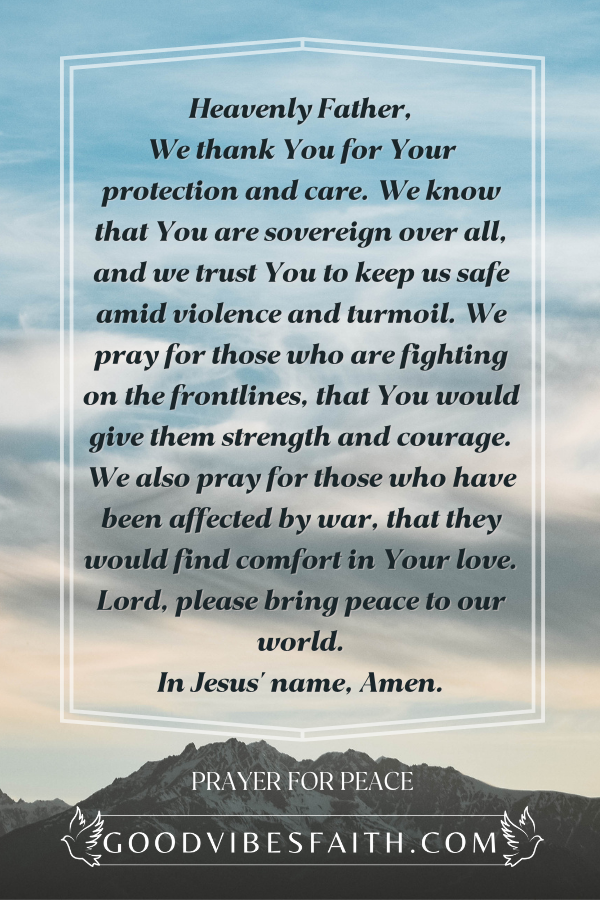What Does The Bible Say About War? A Look at the Verses Dealing With Warfare

The Bible is a complex book with many different topics covered. It’s no surprise that one of those topics is warfare. The Bible has a lot to say about war, and it can be difficult to know what to make of it all. In this blog post, we will take a look at the verses in the Bible that deal with warfare. We will examine what they mean and try to come to some understanding of what God’s perspective on war is.
War And Peace: A Biblical Perspective
The Bible is a complex and varied book, containing many different stories, laws, and teachings. As such, it is not surprising that it contains contradictions and difficult passages. When we examine the verses about war, we need to keep this in mind.
There are going to be some contradictions and some difficult passages to understand. However, by understanding the context in which these verses were written, we can gain a deeper understanding of what they mean. For example, some of the verses about war may have been written during a time of great conflict, when the people were fighting for their very survival.
In other cases, the verses may have been written in times of peace, when the people were simply trying to follow God’s law. By understanding the context of the verses about war, we can gain a more nuanced understanding of what they mean.
Bible Verses That Deal With Warfare
The Bible contains many verses that deal with warfare. For example, Ecclesiastes 3:8 states that
“A time to love, and a time to hate; a time for war, and a time for peace.” Ecclesiastes 3:8 (ESV)
This verse is often quoted to provide a summary of the Bible’s teachings on war and peace. The full context of the verse, however, paints a more nuanced picture. The author of Ecclesiastes notes that there is a time for everything under the sun, and that includes both war and peace.
He goes on to say that God has set a time for every matter, including birth and death, planting and harvesting, weeping and laughter, love and hate. In other words, war and peace are both natural parts of the human experience, and each has its own time and place.
This does not mean that the Bible condones violence, but rather that it recognizes the reality of human conflict and offers guidance on how to deal with it. The important thing is to seek God’s will in all things and to trust that He knows what is best for us.
Similarly, Matthew 24:6 says that,
“And you will hear of wars and rumors of wars. See that you are not alarmed, for this must take place, but the end is not yet.” Matthew 24:6 (ESV)
This verse is often interpreted as a prophecy about the future, and it has been used to support several different eschatological beliefs. However, it is also possible to read this verse as a statement about the present time. In other words, Jesus is not predicting that wars will happen in the future; rather, he is saying that wars are a natural part of human history and they should not be cause for alarm.
This interpretation is supported by the fact that Jesus says “for this must take place“. The word “must” indicates that wars are inevitable and there is nothing that can be done to stop them. This verse provides an important perspective on war and violence, and it encourages people to see beyond the headlines and understand the deeper causes of conflict.
Romans 7:21-25 discusses a different kind of war, the war of the mind.
“So I find this law at work: Although I want to do good, evil is right there with me. For in my inner being I delight in God’s law; but I see another law at work in me, waging war against the law of my mind and making me a prisoner of the law of sin at work within me. What a wretched man I am! Who will rescue me from this body that is subject to death? Thanks be to God, who delivers me through Jesus Christ our Lord!
So then, I myself in my mind am a slave to God’s law, but in my sinful nature a slave to the law of sin.” Romans 7:21-25 (NIV)
In this passage, Paul is struggling with the dichotomy between his desire to do good and the evil that seems to be constantly present within him. He posits that there are two different laws at work within him – one that follows God’s law and one that follows the law of sin. The law of sin is winning the battle, making Paul a “wretched man” who is subject to death. However, he gives thanks to God for delivering him through Jesus Christ.
This passage is significant because it highlights the ongoing struggle that Christians face between their sinful nature and their desire to do good. It also underscores the importance of faith, as it is only through Christ that we can be saved from our sinful nature. This verse provides a deep insight into the human condition and offers hope for those who are struggling with sin.
The book of Jeremiah is full of prophecies of war and destruction, and this verse 51:20 is no exception.
“You are my hammer and weapon of war: with you I break nations in pieces; with you I destroy kingdoms” Jeremiah 51:20 (ESV)
This verse is a clear statement of God’s power and sovereignty over the nations. He is the one who breaks them into pieces and destroys them, and no one can stand against him. It paints a picture of God as a ruthless warrior, wielding His people as a weapon to destroy those who have displeased Him.
The language is harsh and violent, and it leaves no doubt that God is not to be trifled with. While some might see this as a negative portrayal of God, it is important to remember that He is also a loving and merciful God. In the end, His judgment is always just, and He only destroys those who refuse to repent. For those who follow Him, there is no need to fear His wrath. Instead, we can take comfort in knowing that He will always protect us from harm.
The book of Exodus tells the story of Moses leading the Israelites out of slavery in Egypt. As they journey to the Promised Land, they are met by many challenges, including an army of Pharaoh’s soldiers. In Exodus 15, Moses sings a song of triumph after defeating the Egyptians, proclaiming that
“The LORD is a man of war; the LORD is His name.” Exodus 5:13 (NKJV)
The image of God as a warrior appears throughout the Bible, and it offers a glimpse into how God was seen by the ancient Israelites. To them, war was a brutal and bloody business, but it was also a necessary one. In their battles against the Egyptians, the Israelites were fighting for their freedom, and they needed a God who could give them victory. The Lord may not have been experienced in warfare Himself, but He had the power to deliver His people from their enemies.
Taken together, these verses provide a complex picture of warfare. On the one hand, they suggest that war is sometimes necessary and even glorious. On the other hand, they also highlight the destruction and devastation that war can cause. In the end, it is up to each individual to decide how they interpret these verses and what they believe about war. Whatever your stance on warfare may be, we can all agree that it is a topic that should be approached with caution and wisdom.
What Does This Scripture Mean For Us Today?

In a world that is increasingly violent and unstable, it is important to remember that we serve a God who is sovereign over all. No matter what happens, He is in control, and He will protect His people. We can also take comfort in knowing that, although war is sometimes necessary, it is not something to be taken lightly. The Bible reminds us of the gravity of war and the importance of praying for those who are fighting. Let us never forget that, even amid war, God is still a God of love and mercy.
Prayer:
Heavenly Father,
We thank You for Your protection and care. We know that You are sovereign over all, and we trust You to keep us safe amid violence and turmoil. We pray for those who are fighting on the frontlines, that You would give them strength and courage. We also pray for those who have been affected by war, that they would find comfort in Your love. Lord, please bring peace to our world.
In Jesus’ name, Amen.
Bible Verses For Christian Pacifism
Although war is a common theme in the Bible, many verses promote peace. In the Book of Matthew, it is written,
“Blessed are the peacemakers, for they will be called children of God.” Matthew 5:9 (NIV)
This verse speaks to the importance of peacemaking. Those who work for peace will be blessed by God and called His children. This is a powerful message, especially in a world that is so often ravaged by war. It reminds us that we should always strive for peace, even amid conflict.
“Do not take revenge, my dear friends, but leave room for God’s wrath, for it is written: ‘It is mine to avenge; I will repay,’ says the Lord.” Romans 12:19 (NIV)
This verse is a reminder that vengeance belongs to God. We should not seek to exact revenge on those who have wronged us, but instead, leave it in His hands. This is difficult to do, but it is important to remember that God is just and will ultimately bring about justice. In the meantime, we must trust in His goodness and mercy.
“Do all that you can to live in peace with everyone.” Romans 12:18 (NLT)
This verse is a reminder that we should always strive for peace. It is not always possible to avoid conflict, but we should do everything we can to live in peace with those around us. This is a difficult task, but it is one that we are called to by God.
“But the fruit of the Spirit is love, joy, peace, patience, kindness, goodness, faithfulness, gentleness, self-control; against such things there is no law.” Galatians 5:22-23 (ESV)
This verse from the Book of Galatians tells us that the fruit of the Spirit is peace. Those who are led by the Spirit will be peaceful people. This is a beautiful promise and one that we should all strive to achieve in our lives.
What Does The Bible Say About War? A Conclusion
In an increasingly violent world, it is important to remember that we serve a God who is sovereign over all. No matter what happens, He is in control, and He will protect His people. We can also take comfort in knowing that war is sometimes necessary, but it is not something to be taken lightly. These verses remind us of the gravity of war and the importance of praying for those who are fighting. Let us never forget that, even amid war, God is still a God of love and mercy. To be clear, the Bible does not condone war. It speaks out against violence and urges us to love our enemies.
“But I tell you, love your enemies and pray for those who persecute you” Matthew 5:44 (NIV)
However, war is sometimes necessary to protect the innocent and defend against evil. As Christians, we should pray for those who are fighting and for an end to conflict. We should also remember that our ultimate hope is in Christ, who will one day bring lasting peace to the world. Until then, let us be peacemakers in our own lives and proclaim the Gospel of Christ to all people.
You might also like to read What Does The Bible Say About Cremation







